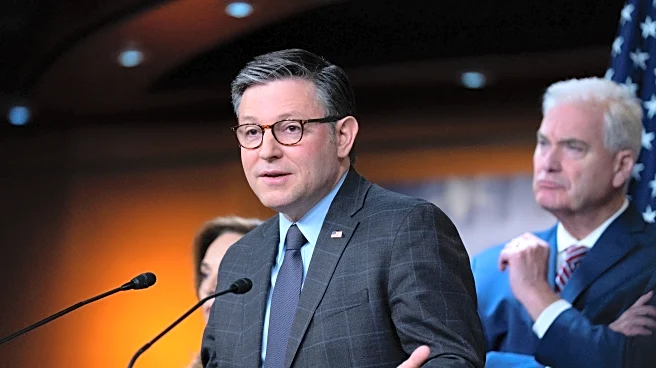What's Happening?
The price of Thanksgiving turkeys is expected to rise significantly due to a worsening bird flu epidemic affecting U.S. turkey flocks. According to industry watchdog Farm Forward, approximately 3 million
turkeys have died from Highly Pathogenic Avian Influenza (HPAI) this year, more than double the bird flu deaths in 2024. This loss represents about 1.45% of the total U.S. turkey flock, leading to a projected increase in wholesale turkey prices by over 26% from last year. Economist Bernt Nelson from the American Farm Bureau Federation suggests the price hike could be closer to 40%. The U.S. turkey flock is at a 40-year low, with production expected to be down 5% from 2024, according to the USDA.
Why It's Important?
The rising turkey prices have significant implications for consumers and the poultry industry, especially during the holiday season when turkey is a staple for many American families. The increased cost may strain household budgets and affect holiday meal planning. Additionally, the epidemic highlights vulnerabilities in the poultry supply chain and raises questions about federal policies regarding animal health and safety. Farm Forward criticizes federal policies for prioritizing profits over public health, suggesting that crowded animal feeding facilities and lack of mandatory HPAI testing have exacerbated the spread of the virus.
What's Next?
The ongoing bird flu epidemic may prompt further scrutiny of federal policies and industry practices related to poultry farming. Stakeholders, including policymakers and industry leaders, may need to consider implementing stricter health protocols and exploring vaccination programs to prevent future outbreaks. Consumers might also seek alternative options for their holiday meals, potentially impacting market demand and pricing strategies for other poultry products.
Beyond the Headlines
The bird flu epidemic underscores broader ethical and environmental concerns associated with industrial farming practices. The reliance on concentrated animal feeding operations raises questions about animal welfare and the sustainability of current agricultural models. Long-term shifts in consumer preferences towards more sustainable and humane farming practices could be triggered by such health crises, influencing future industry standards and regulations.











